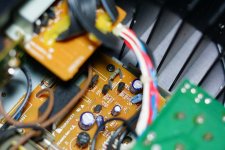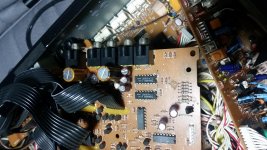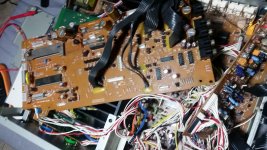Any known issues with nakamichi ta-4a receiver..Re-caping in works
Once in a while I have a little pop when turning on Ta-4a . Pop comes from speakers. I will be replacing all capacitors on audio section of the amp..
I've read on ta-3a. It has couple of weak resistors on power amp section. Near output transistors. R309r and r309L. People go up in watt rating of these resistors.
Are there any similar design flaws in ta-4a?
I spotted an overheated resistor right by dc relay.. it's r903.
Once in a while I have a little pop when turning on Ta-4a . Pop comes from speakers. I will be replacing all capacitors on audio section of the amp..
I've read on ta-3a. It has couple of weak resistors on power amp section. Near output transistors. R309r and r309L. People go up in watt rating of these resistors.
Are there any similar design flaws in ta-4a?
I spotted an overheated resistor right by dc relay.. it's r903.
Attachments
Recaping nakamichi ta-4a. It has 2 12000 71V capacitors That are not available on mouser or digikey.
They have general purpose. United chemicon or cornell dubilier I believe.
Is it worth replacing big capacitors with general purpose.
General purpose sounds more like dishwasher caps. Or caps to operate an elavator in the building.
Any reputable ebay seller out there with good quality products..not counterfeit stuff. Or 30 year old stock.
They have general purpose. United chemicon or cornell dubilier I believe.
Is it worth replacing big capacitors with general purpose.
General purpose sounds more like dishwasher caps. Or caps to operate an elavator in the building.
Any reputable ebay seller out there with good quality products..not counterfeit stuff. Or 30 year old stock.
Parts have specifications, including capacitors. A label like "audio grade" is insufficient in describing whether a capacitor will meet your needs. Look at the specifications provided in the MFG datasheets and compare that to what you need your capacitors to do. That should give you information that you can trust much more than blindly following a marketing label like "audio grade".
More specifically:
You need the new caps to be the same physical size (or almost exactly the same) as the old ones you are replacing.
Capacitance should be the same or greater
You should consider the capacitance tolerance, lifetime, and temperature rating
Because a capacitor is not purely a capacitive component, there is also its resistance and impedance to consider. This will influence the source impedance of your power supply.
I strongly suggest you buy only brand new, recently manufactured (not NOS) capacitors.
More specifically:
You need the new caps to be the same physical size (or almost exactly the same) as the old ones you are replacing.
Capacitance should be the same or greater
You should consider the capacitance tolerance, lifetime, and temperature rating
Because a capacitor is not purely a capacitive component, there is also its resistance and impedance to consider. This will influence the source impedance of your power supply.
I strongly suggest you buy only brand new, recently manufactured (not NOS) capacitors.
Richard_James said:Any reputable ebay seller out there with good quality products..not counterfeit stuff. Or 30 year old stock.
Why take the chance?
Why take the chance?
Some had good luck with some ebayers.
When buying transistors. There is a guy "polida" from taiwan.. someone mentioned he is ok.. but it's only one opinion about this ebayer.
I'll look into specs. I thought audio grade caps are different materials.. Won't change values during vibrations and all that. .
So there really is no difference between elna silmic ii vs same speced general purpose capacitor?
http://www.diyaudio.com/forums/pass...nakamichi-ta-4a-receiver-re-caping-works.html
You mention recapping in that thread.
Why make a new thread ?
You mention recapping in that thread.
Why make a new thread ?
I would bet there is a sonic difference with the SILMICs - whether you like them is another thing.
The SILMICs have hardly any available specs and the one's they do give are not impressive.
Plus, you would have to use a bunch of them which could be a problem with a re-cap.
MICHAEL PERCY stocks NICHICON Gold Tune 80 volts 10,000 and 15,000uf. They are not cheap but they are highly regarded. I have never used the Gold Tunes.
Michael Percy Audio Ordering Information
The SILMICs have hardly any available specs and the one's they do give are not impressive.
Plus, you would have to use a bunch of them which could be a problem with a re-cap.
MICHAEL PERCY stocks NICHICON Gold Tune 80 volts 10,000 and 15,000uf. They are not cheap but they are highly regarded. I have never used the Gold Tunes.
Michael Percy Audio Ordering Information
So there really is no difference between elna silmic ii vs same speced general purpose capacitor?
If the specs are the same, I don't know what the differences would be. Someone else might have a different opinion though of course, such is life.
http://www.diyaudio.com/forums/pass...nakamichi-ta-4a-receiver-re-caping-works.html
You mention recapping in that thread.
Why make a new thread ?
That thread is specifically for any known issues in ta-4a.. like poorly designed hot running circuit. Basically must upgrade parts.
This thread is specifically about big capacitors. Where to buy. I may need other big caps for other amps..
Threads are more fruitful this way.. not confusing. Informative. Focused. TheRe are some mods here who just want to merge all theads into one big thread. Since it's all about audio..
Last edited:
I would bet there is a sonic difference with the SILMICs - whether you like them is another thing.
The SILMICs have hardly any available specs and the one's they do give are not impressive.
Plus, you would have to use a bunch of them which could be a problem with a re-cap.
MICHAEL PERCY stocks NICHICON Gold Tune 80 volts 10,000 and 15,000uf. They are not cheap but they are highly regarded. I have never used the Gold Tunes.
Michael Percy Audio Ordering Information
I have heard going up in voltage is ok. But not capacitance.. would 15000uF be a big jump from 12000?
 Generally we don't like it much when people start a whole bunch of different threads about the same piece of equipment. Such threads are subject to consolidation at the discretion of moderation.
Generally we don't like it much when people start a whole bunch of different threads about the same piece of equipment. Such threads are subject to consolidation at the discretion of moderation.We'd ask you to think carefully about starting threads that are essentially duplicates. It could be well within scope for example to talk about capacitor replacement in the other thread. Choose a title that is sufficiently generic and confine discussions to one place.
Please don't start multiple threads on your other pieces of equipment, one should suffice for each.
Thank You.
Some had good luck with some ebayers.
When buying transistors. There is a guy "polida" from taiwan..
I have bought fake parts from this guys before. May not have been his fault. 2SA798's I think they were....
I have heard going up in voltage is ok. But not capacitance.. would 15000uF be a big jump from 12000?
Should be fine depending on where the cap is in circuit. For powersupply caps some people make significant jumps in capacitor value from the stock cap. Yes, always generally safe to go up in voltage rating (but NEVER down). Yes, sometimes/usually safe to increase capacitance.
Also, NEVER buy old or NOS electrolytics as they do age/dry up. An electrolytic needs to maintain a charge through it to keep it working. If its been in circuit, then it may be old enough to need replacing (there are several schools of thought on this approach, I am personally in favour of always recapping older amps), if its "NOS" and never been in circuit, its a safety hazard.
I have bought fake parts from this guys before. May not have been his fault. 2SA798's I think they were....
Very interesting. Basically an acquaintance bought few transistors from this guys to repair a unit. He said they worked.. but mostly I hear all ebay "new" taiwan or china transistors are fake.. and fail in few weeks.
Last edited:
Should be fine depending on where the cap is in circuit. For powersupply caps some people make significant jumps in capacitor value from the stock cap. Yes, always generally safe to go up in voltage rating (but NEVER down). Yes, sometimes/usually safe to increase capacitance.
Also, NEVER buy old or NOS electrolytics as they do age/dry up. An electrolytic needs to maintain a charge through it to keep it working. If its been in circuit, then it may be old enough to need replacing (there are several schools of thought on this approach, I am personally in favour of always recapping older amps), if its "NOS" and never been in circuit, its a safety hazard.
Hm. I am not that advanced to see if I won't introduce dangerous spikes when going up in capacitance. . I mean u have to be electrical engineer to see if there is a chance to over charge these big capacitors which can blow things down the line. Or maybe these caps only hold 8000uf max at all times.. many people went up in voltage like 5-15% without issues.
If someone replaced these 12000 on nakamichi ta-4a with 15000uf. And had the amp performing solid at loud volumes Id be willing to do that. As far as fitting. There is always a way to fit capacitors in amps. Newer caps in general are smaller.
Just don't want to screw up this marvel) sounds very good.
+1. The values are quite close enough.15000uF will be fine, buy from digikey
Sent from my phone with Tapatalk. Please excuse any typpos.
What about small caps. I am short on two 22uf 16v caps
But have two 22uf 50v elna caps.
Basically any serious problem going up in voltage 3 times?
Those caps are not muse. They are video board. I did not really think I will be using video board. But suspected that maybe few audio circuits are on video board. Just decided to do the whole thing.
But have two 22uf 50v elna caps.
Basically any serious problem going up in voltage 3 times?
Those caps are not muse. They are video board. I did not really think I will be using video board. But suspected that maybe few audio circuits are on video board. Just decided to do the whole thing.
Attachments
Last edited:
Found this online..
Yes, the voltage is the high end rating of the capacitor but the capacitor is for storing electrons measured in farads or microfarads.
If you forget about the technical jargon, think of it like a battery. Not quite the same but if you have a 24 volt battery supplying a circuit that has a cut off of 19 volts and you only charge it to 12 volts, you have a lot less electrons to supply your circuit than what is needed and chances are the circuit won't work.
A 25 μμF capacitor that is rated at 16 volts will have a 25 μμF capacitance when operated near the 16 volts but if you substitute a 25 μμF capacitor rated at 35 volts you will not have 25 μμF capacitance if you only apply 16 volts.
These capacitors have many functions in circuits. One main function is to supply electrons to a circuit when the normal plug in supply has dropped lower than needed such as with alternating current. As the voltage and current reverse, 60 times a second, the level goes from around 170 volts peak down to zero volts and on down to -170 volts and then it repeats. The capacitors filter this drop by supplying the appropriate voltage to keep the circuit smooth. As the voltage rises back up again, it recharges the capacitor.
A leaky capacitor has the effect of a large rated capacitor that leaks and keeps the circuit from working properly. In most cases, you can over rate a capacitor and get away with it. If you double the voltage value of the capacitor but keep the supply voltage low you might want to also double the Farad value. Ex: 25 μμF at 16 volts to become 50 μμF at 35 volts running on 16 volt supply.
Yes, the voltage is the high end rating of the capacitor but the capacitor is for storing electrons measured in farads or microfarads.
If you forget about the technical jargon, think of it like a battery. Not quite the same but if you have a 24 volt battery supplying a circuit that has a cut off of 19 volts and you only charge it to 12 volts, you have a lot less electrons to supply your circuit than what is needed and chances are the circuit won't work.
A 25 μμF capacitor that is rated at 16 volts will have a 25 μμF capacitance when operated near the 16 volts but if you substitute a 25 μμF capacitor rated at 35 volts you will not have 25 μμF capacitance if you only apply 16 volts.
These capacitors have many functions in circuits. One main function is to supply electrons to a circuit when the normal plug in supply has dropped lower than needed such as with alternating current. As the voltage and current reverse, 60 times a second, the level goes from around 170 volts peak down to zero volts and on down to -170 volts and then it repeats. The capacitors filter this drop by supplying the appropriate voltage to keep the circuit smooth. As the voltage rises back up again, it recharges the capacitor.
A leaky capacitor has the effect of a large rated capacitor that leaks and keeps the circuit from working properly. In most cases, you can over rate a capacitor and get away with it. If you double the voltage value of the capacitor but keep the supply voltage low you might want to also double the Farad value. Ex: 25 μμF at 16 volts to become 50 μμF at 35 volts running on 16 volt supply.
- Status
- Not open for further replies.
- Home
- Amplifiers
- Pass Labs
- Is it worth using geneal purpose new capacitors instead of audio grade but old


